
M. C. Escher� Doric columns� 1945

As Stormy Daniels and Elizabeth Warren see their ‘cases’ blow up in their faces 3 weeks before the midterms, the best PR and legal teams that money can buy are framing a Khashoggi narrative nobody will be able to credibly deny. Or at least Erdogan is not showing his hand. But now that Pompeo’s in the region anyway, let’s put this on his agenda. 12 to 13 million at risk of starvation.
• Yemen On Brink Of ‘World’s Worst Famine In 100 Years’ (G.)
Yemen could be facing the worst famine in 100 years if airstrikes by the Saudi-led coalition are not halted, the UN has warned. If war continues, famine could engulf the country in the next three months, with 12 to 13 million civilians at risk of starvation, according to Lise Grande, the agency’s humanitarian coordinator for Yemen. She told the BBC: “I think many of us felt as we went into the 21st century that it was unthinkable that we could see a famine like we saw in Ethiopia, that we saw in Bengal, that we saw in parts of the Soviet Union – that was just unacceptable. “Many of us had the confidence that would never happen again and yet the reality is that in Yemen that is precisely what we are looking at.”
Yemen has been in the grip of a bloody civil war for three years after Houthi rebels, backed by Iran, seized much of the country, including the capital, Sana’a. The Saudi-led coalition has been fighting the rebels since 2015 in support of the internationally recognised government. Thousands of civilians have been caught in the middle, trapped by minefields and barrages of mortars and airstrikes. The resulting humanitarian catastrophe has seen at least 10,000 people killed and millions displaced. Speaking on Sunday evening, Grande said: “There’s no question we should be ashamed, and we should, every day that we wake up, renew our commitment to do everything possible to help the people that are suffering and end the conflict.”

And it’s not just people that we’re killing:
• Humanity Is ‘Cutting Down The Tree Of Life’ (G.)
Humanity’s ongoing annihilation of wildlife is cutting down the tree of life, including the branch we are sitting on, according to a stark new analysis. More than 300 different mammal species have been eradicated by human activities. The new research calculates the total unique evolutionary history that has been lost as a result at a startling 2.5bn years. Furthermore, even if the destruction of wild areas, poaching and pollution were ended within 50 years and extinction rates fell back to natural levels, it would still take 5-7 million years for the natural world to recover. Many scientists think a sixth mass extinction of life on Earth has begun, propelled by human destruction of wildlife, and 83% of wild mammals have already gone.
The new work puts this in the context of the evolution and extinction of species that occurred for billions of years before modern humans arrived. “We are doing something that will last millions of years beyond us,” said Matt Davis at Aarhus University in Denmark, who led the new research. “It shows the severity of what we are in right now. We’re entering what could be an extinction on the scale of what killed the dinosaurs. “That is pretty scary. We are starting to cut down the whole tree [of life], including the branch we are sitting on right now.” Ecosystems around the world have already been significantly affected by the extermination of big animals such as mammoths, he said.
[..] Davis said each lost species had its own intrinsic value, but the loss of the most distinct creatures was most damaging: “Typically, if you have something that is off by itself, it does some job that no other species is doing.” The losses are already affecting ecosystems, he said, particularly the vanishing of “megafauna”. These huge creatures roamed much of Earth until humans arrived and included giant cats, deer, beavers and armadillos. “We are now living in a world without giants,” said Davis. “So the seeds of big fruit are not dispersed any more because we don’t have mammoths or gomphotheres or giant ground sloths eating those fruits.” Another example, he said, is the widespread loss of wolves. This means smaller predators like coyotes thrive and more birds are killed, radically changing food chains.

“Between January 1977 and January 2013, the catch rate in the sticky ground traps fell 60-fold..”
“..our study indicates that climate warming is the driving force behind the collapse of the forest’s food web. ”
• ‘Hyperalarming’ Study Shows Massive Insect Loss (WaPo)
Insects around the world are in a crisis, according to a small but growing number of long-term studies showing dramatic declines in invertebrate populations. A new report suggests that the problem is more widespread than scientists realized. Huge numbers of bugs have been lost in a pristine national forest in Puerto Rico, the study found, and the forest’s insect-eating animals have gone missing, too. In 2014, an international team of biologists estimated that, in the past 35 years, the abundance of invertebrates such as beetles and bees had decreased by 45 percent. In places where long-term insect data are available, mainly in Europe, insect numbers are plummeting. A study last year showed a 76 percent decrease in flying insects in the past few decades in German nature preserves.
The latest report, published Monday in the Proceedings of the National Academy of Sciences, shows that this startling loss of insect abundance extends to the Americas. The study’s authors implicate climate change in the loss of tropical invertebrates. “This study in PNAS is a real wake-up call — a clarion call — that the phenomenon could be much, much bigger, and across many more ecosystems,” said David Wagner, an expert in invertebrate conservation at the University of Connecticut who was not involved with this research. He added: “This is one of the most disturbing articles I have ever read.”
[..] “We went down in ’76, ’77 expressly to measure the resources: the insects and the insectivores in the rain forest, the birds, the frogs, the lizards,” Lister said. He came back nearly 40 years later, with his colleague Andrés García, an ecologist at the National Autonomous University of Mexico. What the scientists did not see on their return troubled them. “Boy, it was immediately obvious when we went into that forest,” Lister said. Fewer birds flitted overhead. The butterflies, once abundant, had all but vanished. García and Lister once again measured the forest’s insects and other invertebrates, a group called arthropods that includes spiders and centipedes. The researchers trapped arthropods on the ground in plates covered in a sticky glue, and raised several more plates about three feet into the canopy.
The researchers also swept nets over the brush hundreds of times, collecting the critters that crawled through the vegetation. Each technique revealed the biomass (the dry weight of all the captured invertebrates) had significantly decreased from 1976 to the present day. The sweep sample biomass decreased to a fourth or an eighth of what it had been. Between January 1977 and January 2013, the catch rate in the sticky ground traps fell 60-fold. “Everything is dropping,” Lister said. The most common invertebrates in the rain forest — the moths, the butterflies, the grasshoppers, the spiders and others — are all far less abundant. “Holy crap,” Wagner said of the 60-fold loss.
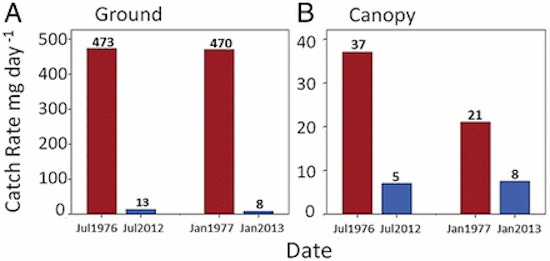
Comparison of the average dry-weight biomass of arthropods caught per 12-h day in 10 ground (A) and canopy (B) traps within the same sampling area in the Luquillo rainforest.

If there are no insects left, who cares about deficits? What’s the use?
• America’s Budget Deficit Jumps By 17% As Spending Surges (CNBC)
The U.S. federal budget deficit rose in fiscal 2018 to the highest level in six years as spending climbed, the Trump administration said Monday. The deficit jumped to $779 billion, $113 billion or 17 percent higher than the previous fiscal period, according to a statement from Treasury Secretary Steven Mnuchin and Office of Management and Budget Director Mick Mulvaney. It was larger than any year since 2012, when it topped $1 trillion. The budget shortfall rose to 3.9 percent of U.S. GDP. The deficit increased by $70 billion less than anticipated in a report published in July, according to the two officials.
Federal revenue rose only slightly, by $14 billion after Republicans chopped tax rates for corporations and most individuals. Outlays climbed by $127 billion, or 3.2 percent. A spike in defense spending, as well as increases for Medicaid, Social Security and disaster relief, contributed to the increase.

“If the goal was to bail out the banks at public expense (and it was) it’s clear Bernanke had a far better plan than the ECB.”
• More Free Money: A Carry Trade in Liquidity (Mish)
Not only do banks earn free money on excess reserves, they can borrow money and make guaranteed free money on that.
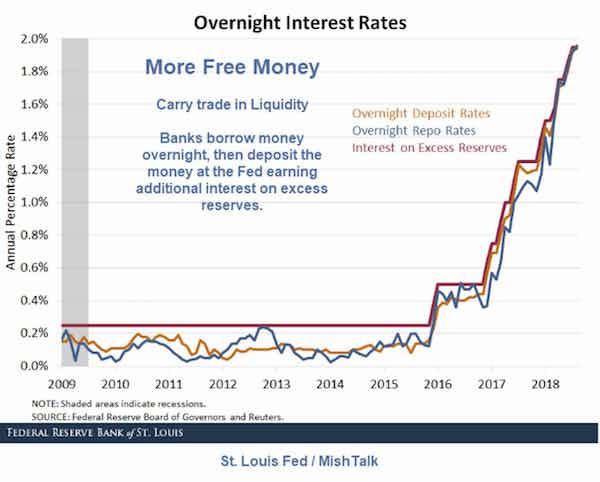
The Federal Reserve Bank of St. Louis discusses the Carry Trade in Liquidity: “The IOER [interest on excess reserves] has been the effective ceiling of other short-term interest rates. The figure above compares the IOER with overnight rates on deposits and repos. As we can see, the IOER has mostly remained above these two rates, implying that (at least some) banks have been able to borrow funds overnight, deposit them at the Fed and earn a spread, in essence engaging in carry trade in liquidity markets.”
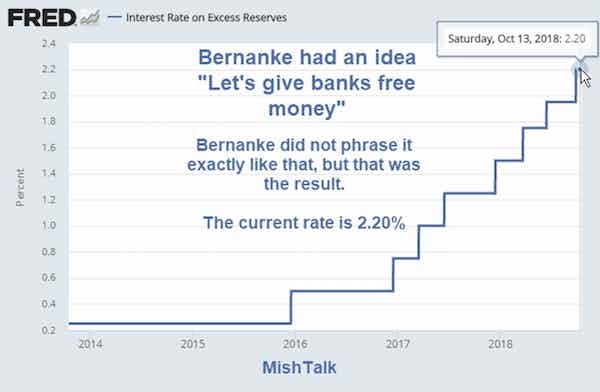
How Much Free Money?
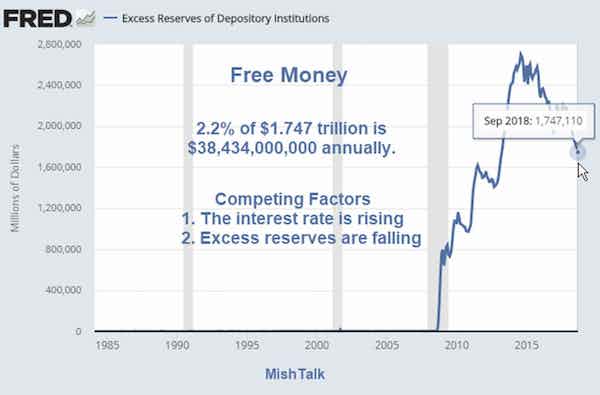
While the Fed has been busy giving banks free money by paying interest on excess reserves, banks in the EU have suffered with negative interest rates, essentially taking money from banks and making them more insolvent. If the goal was to bail out the banks at public expense (and it was), it’s clear Bernanke had a far better plan than the ECB.

The Fed’s been flying blind at least since Bernanke talked about ‘entering uncharted territory’. That’s what that means.
• Powell Has Lost His North Star, And The Fed Is Flying Blind (MW)
Federal Reserve Chairman Jerome Powell is in an unenviable position. Folks expect him to fine-tune interest rates to keep the economy going and inflation tame but he can’t make things much better — only worse. Growth is nearly 3% and unemployment is at its lowest level since 1969. What inflation we have above the Fed target of 2% is driven largely by oil prices and those by forces beyond the influence of U.S. economic conditions — OPEC politics, U.S. sanctions on Iran, and dystopian political forces in Venezuela and a few other garden spots. When the current turbulence in oil markets recedes, we are likely in for a period of headline inflation below 2%, just as those forces are now driving prices higher now.
Overall, long-term inflation has settled in at the Fed target of about 2%. The Fed should not obsess about it but keep a watchful eye. Amid all this, Powell’s inflation compass has gone missing. The Phillips curve, as he puts it, may not be dead but just resting. To my thinking, it’s in a coma if it was ever alive at all. That contraption is a shorthand equation sitting atop a pyramid of more fundamental behavioral relationships. Those include the supply and demand for domestic workers and in turn, an historically large contingent labor force of healthy prime-age adults sitting on the sidelines, the shifting skill requirements of a workplace transformed by artificial intelligence and robotics, import prices influenced by weak growth in Europe and China, and immigration.
Of course, Mariner Powell has his North Star — what economists affectionately call R* (R-Star), but it is no longer at a fixed position in Powell’s sky. R* is the federal funds rate that neither encourages the economy to speed up or slow down. However, with businesses needing much less capital to get started or grow these days and for decades China and Germany—the second and fourth largest economies globally—racking up current account surpluses and savings to invest abroad, it is no wonder the forces of supply and demand have been driving R* down to historically low levels.

They use what they don’t pay in taxes, to spy on you.
• Facebook Paid £15.8 Million In UK Tax On £1.2 Billion In 2017 Revenues (BBC)
Facebook’s UK tax bill has tripled to £15.8m – but the social media giant will see an immediate cut because of a tax credit. The final bill comes to £7.4m, since Facebook will see tax relief of £8.4m after awarding shares to employees. In 2016, Facebook’s tax bill rose to £5.1m, following a major overhaul of the social media firm’s tax structure. However, the company’s profits only climbed by £4m year-on-year from £58.4m to £62.7m in 2017. The company’s UK office provides marketing services and sales and engineering support to the company. Facebook’s revenue rose by a third year-on-year to £1.2bn in 2017, because of increased revenues from inter-company and advertising reseller services in 2017.
“We have changed the way we report tax so that revenue from customers supported by our UK teams is recorded in the UK and any taxable profit is subject to UK corporation tax,” said Facebook’s Northern Europe vice-president, Steve Hatch. [..] The publication of Facebook’s 2017 tax accounts follows extensive criticism from policymakers and the media over the last 12 months of how much tax tech giants typically pay in Europe. Large technology companies have been condemned for moving sales through other countries and paying modest amounts of tax in the UK.

Hard to gauge what exactly this means, time must tell. Seems good that they talk of medical help. but will he be able to get it?
• Ecuador To Assange: No Talking Politics, Pay Own Bills, Look After Cat (RT)
WikiLeaks supporters were thrilled to hear that Ecuador would restore Julian Assange’s internet connection. But his hosts – who have in some ways become his jailers – reportedly imposed a long list of restrictions on his behavior. While stating that he is allowed to exercise his “right of communication and freedom of expression,” a nine-page document already leaked online forbids the journalist from engaging in political activity or doing anything to interfere in the affairs of other states. The document expressly states that Ecuador cannot be held liable for the content of Assange’s communications, but nevertheless prohibits him from engaging in activities that might damage the relationship between Ecuador and other states.
Assange’s communications were cut seven months ago, after he criticized Spanish authorities’ treatment of voters during the Catalan independence referendum. Assange must pay for his own WiFi. He must use only his own devices, absent written government permission, and provide the embassy with serial number, model number, and brand name for those devices. He must also pay for his own medical evaluations, with the option of transferring to a hospital in case of an emergency – an option repeatedly denied him by UK authorities, who refused to guarantee safe passage without arrest in the event of such a transfer. Assange’s health has been the subject of much concern during his six-year confinement in the Embassy.
Visitors are also slapped with new restrictions. They must submit visit requests in writing to the embassy chief, giving their name, nationality, profession and place of work, reason for visiting, email and social media accounts, and even the serial numbers for phones and other devices they wish to bring inside. The new rules even mandate the collection of IMEIs, unique identification numbers specific to a phone handset. While repeat visitors receive a less restrictive screening process, they can have their access revoked at any time without an explanation. All visitor data will be turned over to the Ecuadorian Ministry of Foreign Affairs and other unspecified parties.
The restrictions include a threat to use UK police to arrest visitors or seize communications equipment should the journalist violate the lengthy list of rules. Adding insult to injury, the embassy threatened to remove Assange’s cat to a shelter should they decide he is not cleaning up after the animal properly.

They lost two years doing nothing but fight amongst themselves. That time was always badly needed.
• Brexit Deal Slipping To December Amid Deadlocked Talks (Ind.)
A Brexit deal now looks unlikely until just before Christmas after Theresa May admitted “weeks” may be needed to break the deadlock in talks with Brussels. The delay was also signalled by Ireland’s prime minister who warned of log-jammed negotiations dragging into December, increasing concern that stalled talks could simply collapse into a “disaster” no-deal situation. In a veiled swipe at Brexiteers, European Council President Donald Tusk said solving the vexed issue of the Irish border had proved “more complicated than some may have expected” and said no deal is now “more likely than ever”.
A further sign of slippage came when the EU confirmed it would take a decision this week on whether a special summit once proposed for November to publicly seal a Brexit deal, will be needed given the state of talks. But despite the deadlock, Ms May again came under intense pressure from Conservative Eurosceptics to refuse anything resembling the EU’s proposals, amid signs she is diluting her stance to secure a deal. The October summit was once supposed to be the moment a withdrawal deal was locked in, with expectations already having slipped to a potential specially arranged meeting in November – even under those circumstances the outline would have had to have been agreed at this week’s meeting.
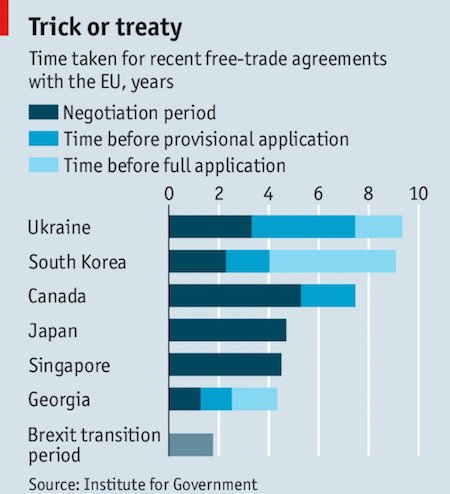

More likely by the day.
• No-Deal Brexit Is ‘More Likely Than Ever Before’ – Tusk (Ind.)
A no-deal Brexit is “more likely than ever before”, the president of the European Council has warned, ahead of a make-or-break summit of EU leaders in Brussels. Donald Tusk, who has described this week’s top-level meeting as “the moment of truth”, said Brexit had “proven to be more complicated than some may have expected”. But he said that “that we are preparing for a no-deal scenario must not, under any circumstances, lead us away from making every effort to reach the best agreement possible”.
Mr Tusk’s warning, made in a letter to EU leaders formally inviting them to the summit, comes a day after negotiations between the European Commission and UK Government hit a a wall over the question of how to prevent a hard border in Northern Ireland. Over dinner on Wednesday night the heads of state or government of the 27 remaining EU member states will decide whether there is any pointing holding a special Brexit summit in November – or whether the horse has already bolted. It is now confirmed that Theresa May will address the 27 leaders before the dinner in a last-ditch bid to win them over; though she will not be allowed into the main discussion itself.

Russia and Assad delayed their final offensive to offer the jihadists a way out. But now these are refusing to leave.
• Syria’s Chessboard (Hallinan)
The Syrian civil war has always been devilishly complex, with multiple actors following different scripts, but in the past few months it appeared to be winding down. The Damascus government now controls 60 percent of the country and the major population centers, the Islamic State has been routed, and the rebels opposed to Syrian President Bashar al-Assad are largely cornered in Idilb Province in the country’s northwest. But suddenly the Americans moved the goal posts—maybe—the Russians have fallen out with the Israelis, the Iranians are digging in their heels, and the Turks are trying to multi-task with a home front in disarray. So the devil is still very much at work in a war that has lasted more than seven years, claimed up to 500,000 lives, displaced millions of people, destabilized an already fragile Middle East, and is far from over.
There are at least three theaters in the Syrian war, each with its own complexities: Idilb in the north, the territory east of the Euphrates River, and the region that abuts the southern section of the Golan Heights. Just sorting out the antagonists is daunting. Turks, Iranians, Americans and Kurds are the key actors in the east. Russians, Turks, Kurds and Assad are in a temporary standoff in the north. And Iran, Assad and Israel are in a faceoff near Golan, a conflict that has suddenly drawn in Moscow. Assad’s goals are straightforward: reunite the country under the rule of Damascus and begin re-building Syria’s shattered cities. The major roadblock to this is Idilb, the last large concentration of anti-Assad groups, Jihadists linked with al-Qaeda, and a modest Turkish occupation force representing Operation Olive Branch. The province, which borders Turkey in the north, is mountainous and re-taking it promises to be difficult.
For the time being there is a stand down. The Russians cut a deal with Turkey to demilitarize the area around Idilb city, neutralize the jihadist groups, and re-open major roads. The agreement holds off a joint Assad-Russian assault on Idilb, which would have driven hundreds of thousands of refugees into Turkey and likely have resulted in large numbers of civilian casualties. But the agreement is temporary—about a month—because Russia is impatient to end the fighting and begin the reconstruction. However, it is hard to see how the Turks are going to get a handle on the bewildering number of groups packed into the province, some of which they have actively aided for years. Ankara could bring in more soldiers, but Turkey already has troops east of the Euphrates and is teetering on the edge of a major economic crisis.








